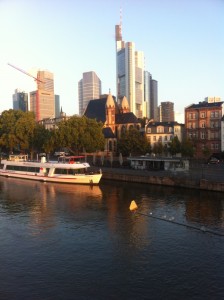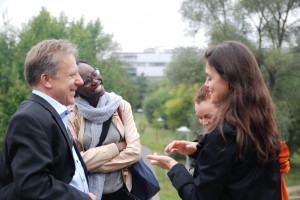Germany had a rather poor summer this year. Not good news for people with photovoltaic panels on their houses; of which there are many! And they’re going to need a whole lot more if they’re to transition to low carbon energy supply at the same time as phasing out nuclear power. They have a lot of barriers to address in order to make this transition happen.
Which provides my neat segway to the rather lengthily titled Making Transitions Happen Climate KIC PhD Summer School focussed on the topic of:
Energy Transition in Frankfurt – Overcoming Barriers to Change
33 students from 28 different countries, representing universities from around the world; Finnland and Norway to Thailand and Melbourne; came together in Frankfurt earlier this month to learn about and collaborate together to tackle Frankfurt’s transitions challenge:
100% renewable energy by 2050
And I had the privilege to be one of them.
Students, coaches and guest speakers alike were all put up in a hotel right in the heart of the city of Frankfurt, in the bustling Bahnhofsviertel (Station quarter). There was some consternation at having to share rooms, but on the whole these reservations were quickly forgotten, helped in my case by some silicon earplugs.
The emphasis of the school was on application and so many of the speakers were practitioners from the public and private sector. Martin Powell, currently head of urban development at Siemens and former advisor to the Mayors of London and New York, was a particular highlight for many, sharing insights from cities around the world who tackle sustainability in different ways. Also popular was Dr Sergio Castellari, a former UNFCCC negotiator for Italy, who gave us a ‘behind the scenes’ tour of the UN climate negotiations process.
The excursions too were fascinating; from a 1200 year old house, in need of an energy retrofit, to a state of the art Combined Heat and Power plant serving one of Europe’s largest industrial parks.
Both lectures and excursions were tailored to provide us with background information needed for the team challenge: to develop an innovative idea for addressing specific transitions barriers in Frankfurt. My team worked on developing an innovative communications strategy for the city. Our concept was to engage with the public and create a broad sense of ownership of the city’s vision for 100% renewable energy supply. We called the idea ‘Communicate – Activate’ and argued that by connecting the vision to things that matter to people the city can motivate action through positive peer pressure, competition and gamification. The jury liked our idea and we were joint winners of the overall contest and also managed to scoop the audience award for the best presentation. The prize is a trip to Brussels to join the Open Platform event of the Climate-KIC transitions network. You can see more details about our proposal and those of the other participants on the summer school website: http://ckic-phd-ffm.net/projects-2014/
The summer school was a pressure cooker experience with 10 hour days during the lecture phase, increasing to 14 and 15 hour days during the project phase. This took its toll on some of the groups and tensions rose as patience levels dropped. The cross-cultural element of working with students from around the globe is something many hadn’t experienced before and it often subtly undermines the communication process. Our team’s success was as much a testament to our ability to listen to each other as it was to our innovative idea.
That is a key lesson of transitions; innovation is not enough. It has to function in the wider socio-technical system. And that requires systemic change: change of behaviours, social norms, economic and technological structures… you name it.
The summer school is funded by the Making Transitions Happen platform of the EU Climate-KIC programme. Travel to the school was generously funded by the TSBE centre at the University of Reading.
View my research profile here








2 Responses to Climate-KIC Summer School Success